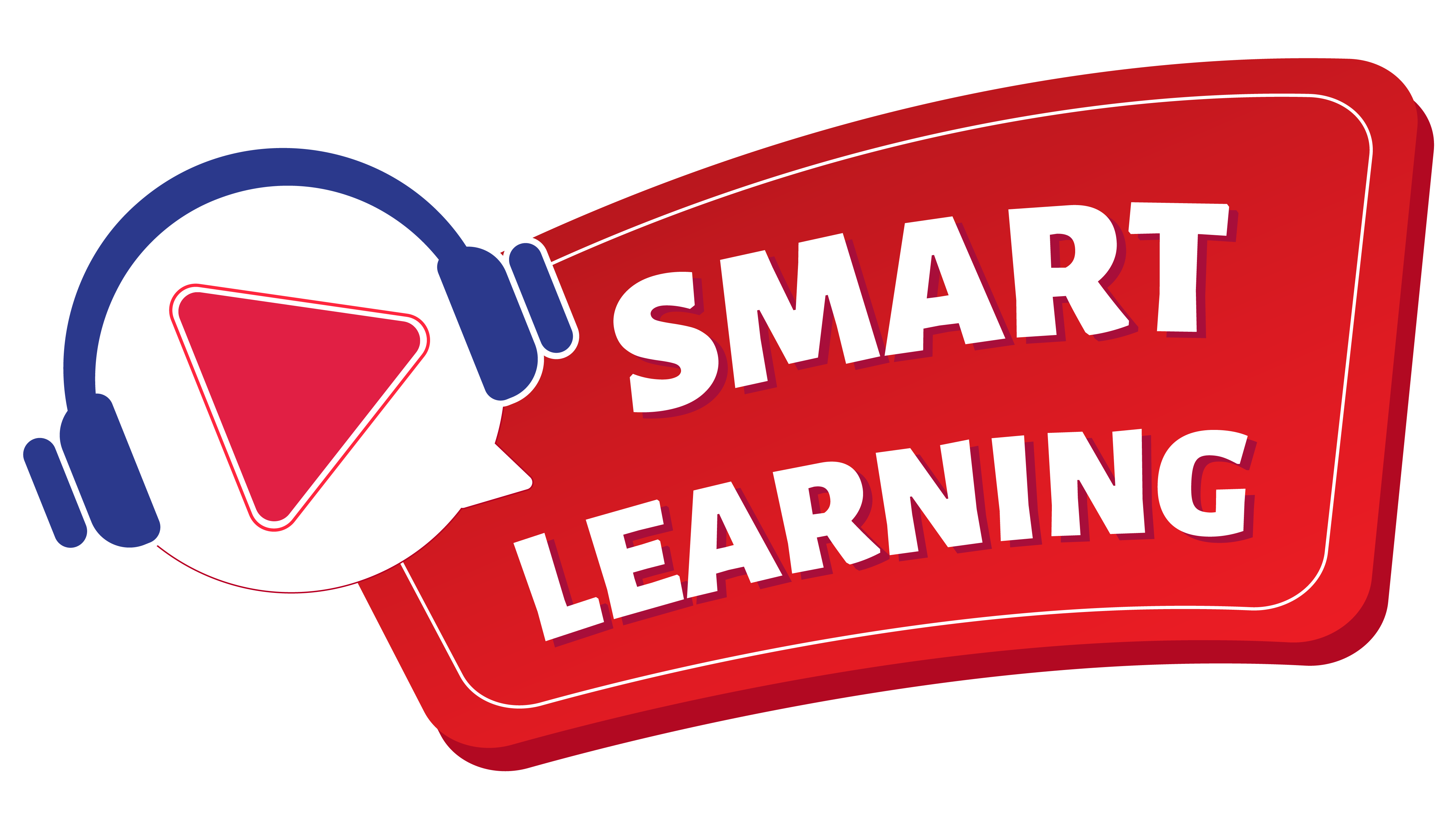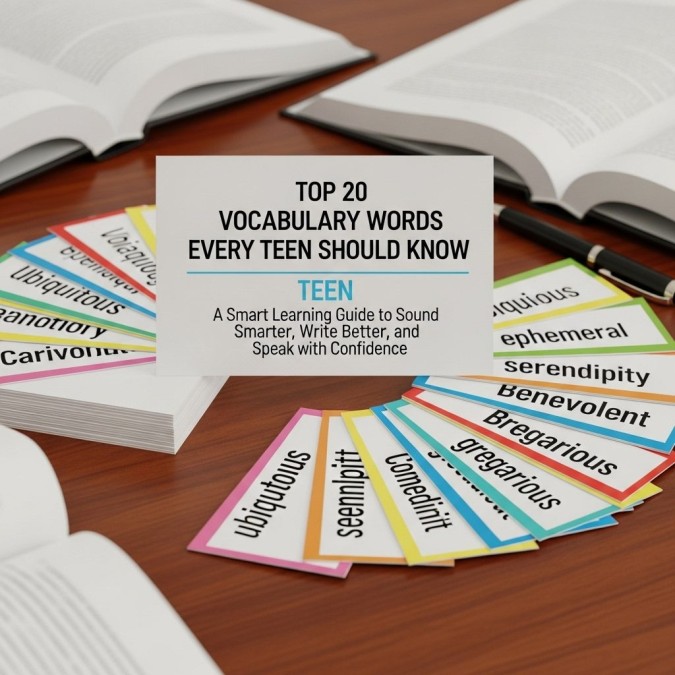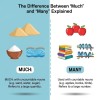📚 Top 20 Vocabulary Words Every Teen Should Know
A Smart Learning Guide to Sound Smarter, Write Better, and Speak with Confidence
✨ Section 1: Why Vocabulary Matters More Than You Think
Vocabulary isn’t just about memorizing words—it’s about unlocking your ability to express ideas, emotions, and opinions with precision. Whether you’re writing a school essay, chatting with international friends, or preparing for an English exam, the words you choose shape how others perceive you.
For Thai teens learning English, vocabulary is often the biggest barrier to fluency. You might know the grammar, understand the sentence structure, but still struggle to find the right word. That’s where this guide comes in.
We’ve curated 20 powerful, versatile, and teen-relevant words that will instantly upgrade your English. These aren’t obscure SAT terms or textbook jargon—they’re words you’ll actually use in conversations, writing, and real life.
🧠 What Makes a Word “Essential”?
We chose words based on:
- Frequency: How often native speakers use them
- Functionality: How many contexts they fit into
- Teen Relevance: How useful they are in school, social media, and daily life
- Confidence Boost: Words that make you sound smart without sounding fake
🔍 Common Vocabulary Pitfalls
Before we dive into the list, let’s address a few traps:
- Overusing basic words: “Good,” “bad,” “nice,” “thing”—they’re fine, but vague.
- Misusing advanced words: Saying “literally” when you mean “figuratively,” or “awesome” for everything.
- Translating directly from Thai: Some Thai words don’t have a one-to-one English match, leading to awkward phrasing.
Smart Learning helps you avoid these traps by teaching vocabulary in context—not just definitions, but how to use each word naturally.
🚀 Section 2: The Top 20 Vocabulary Words Every Teen Should Know
Here’s your curated list, with definitions, examples, and usage tips.
1. Reliable
Meaning: Someone or something you can trust
Example: “She’s a reliable friend—I know she’ll keep my secret.”
🧠 Use it to describe people, apps, or sources of information.
2. Confident
Meaning: Sure of yourself or your abilities
Example: “He’s confident when speaking English in front of the class.”
🧠 Great for describing personality or performance.
3. Challenge
Meaning: A difficult task or situation
Example: “Learning English is a challenge, but I’m improving every day.”
🧠 Use it to show growth mindset.
4. Creative
Meaning: Able to think of new ideas
Example: “Her TikTok videos are so creative!”
🧠 Perfect for school projects, hobbies, and compliments.
5. Motivate
Meaning: To inspire someone to take action
Example: “My teacher motivates me to study harder.”
🧠 Use it to describe influence or encouragement.
6. Respect
Meaning: Admiration or consideration for others
Example: “We should respect different opinions.”
🧠 Essential for social and emotional learning.
7. Improve
Meaning: To get better
Example: “I want to improve my pronunciation.”
🧠 Use it in goals, feedback, and progress tracking.
8. Support
Meaning: To help or encourage
Example: “My parents support my dream to study abroad.”
🧠 Use it in relationships, teamwork, and motivation.
9. Goal
Meaning: Something you aim to achieve
Example: “My goal is to speak English fluently.”
🧠 Use it in planning and self-reflection.
10. Curious
Meaning: Wanting to learn or know more
Example: “I’m curious about how AI works.”
🧠 Great for describing personality and learning style.
11. Responsible
Meaning: Able to take care of things or people
Example: “She’s responsible for organizing the school event.”
🧠 Use it in leadership and trust contexts.
12. Effort
Meaning: Hard work or energy used to do something
Example: “He put a lot of effort into his presentation.”
🧠 Use it to describe dedication and achievement.
13. Opportunity
Meaning: A chance to do something
Example: “This scholarship is a great opportunity.”
🧠 Use it in career, education, and life planning.
14. Positive
Meaning: Optimistic or good
Example: “She always has a positive attitude.”
🧠 Use it to describe mindset and behavior.
15. Challenge
Meaning: A difficult task or situation
Example: “This math problem is a challenge.”
🧠 Use it to show resilience and growth.
16. Achieve
Meaning: To succeed in doing something
Example: “I achieved my goal of passing the exam.”
🧠 Use it in success stories and motivation.
17. Communicate
Meaning: To share information or feelings
Example: “We need to communicate clearly in group projects.”
🧠 Use it in teamwork and relationships.
18. Respectful
Meaning: Showing respect
Example: “He’s respectful to his teachers.”
🧠 Use it to describe behavior and manners.
19. Independent
Meaning: Able to do things without help
Example: “She’s independent and manages her own schedule.”
🧠 Use it in personal growth and maturity.
20. Confident
Meaning: Sure of yourself
Example: “I feel confident speaking English now.”
🧠 Use it to show progress and self-esteem.
📝 Practice Challenge
Write a short paragraph using at least 5 of these words. Example:
“I’m curious about learning new languages. My goal is to become fluent in English. I know it’s a challenge, but I’m confident I can improve with effort and support from my teachers.”
🌟 Section 3: How to Learn and Use Vocabulary Effectively
Knowing the words is just the beginning. Here’s how to make them stick.
🔹 Tip 1: Use Flashcards with Context
Don’t just memorize definitions—write example sentences and review them daily.
🔹 Tip 2: Speak the Words
Use new vocabulary in conversations, even if it feels awkward at first. Smart Learning’s voice practice tool helps you get comfortable.
🔹 Tip 3: Write with Purpose
Start a journal or blog. Use new words to describe your day, your goals, or your feelings.
🔹 Tip 4: Read and Highlight
Read English articles, books, or social media posts. Highlight words you recognize and try to use them.
🔹 Tip 5: Quiz Yourself
Smart Learning offers adaptive quizzes that test your vocabulary in different contexts—writing, speaking, and listening.
🔹 Tip 6: Group Words by Theme
Instead of random lists, group words by topic: emotions, school, hobbies, goals. This helps your brain organize them better.
🔹 Tip 7: Teach Someone Else
Explaining a word to a friend helps you understand it more deeply.
🔹 Tip 8: Track Your Progress
Use Smart Learning’s dashboard to see how many words you’ve mastered. Celebrate milestones!
💬 Final Thoughts
Vocabulary is the foundation of fluency. These 20 words aren’t just useful—they’re empowering. They help you express who you are, what you believe, and where you’re going. With Smart Learning, you’re not just memorizing—you’re mastering.
So start today. Pick 5 words. Use them. Own them. And watch your English confidence grow.



